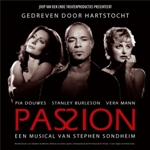Passion
Musical (1994)

The story was originally based on a 19th-century novel by Iginio Ugo Tarchetti, an experimental Italian writer who was prominently associated with the Scapigliatura movement. His book Fosca was a fictionalized recounting of an affair he'd once had with an epileptic woman when he was a soldier.
Sondheim first came up with the idea of writing a musical when he saw the Italian film in 1983:
As Fosca started to speak and the camera cut back to her, I had my epiphany. I realized that the story was not about how she is going to fall in love with him, but about how he is going to fall in love with her . . . at the same time thinking, "They're never going to convince me of that, they're never going to pull that off," all the while knowing they would, that Scola wouldn't have taken on such a ripely melodramatic story unless he was convinced that he could make it plausible. By the end of the movie, the unwritten songs in my head were brimming and I was certain of two things. First, I wanted to make it into a musical, the problem being that it couldn't be a musical, not even in my nontraditional style, because the characters were so outsized. Second, I wanted James Lapine to write it; he was a romantic, he had a feel for different centuries and different cultures, and he was enthusiastically attracted to weirdness.
As it turned out, Lapine was already exploring the idea of adapting Muscle, a memoir by Sam Fussell, for the musical stage. Together, they came up with the idea of a pair of double-billing one acts. Lapine wrote a couple of scenes and Sondheim had just started working on the opening number when he began to feel that his musical style was unsuitable for Muscle. The piece were contemporary and, in his opinion, required a score reflecting pop sensibilities. He called up Lapine and suggested that he find another songwriter, perhaps William Finn, and include it as a companion piece. Meanwhile, they continued to work on Passion and as the piece grew, they found that it was enough to fill out an entire evening of theatre. Muscle was eventually shelved.
Original Broadway Production
The role of Fosca was originally offered to Patti LuPone, but she turned it down to star in Sunset Boulevard in the West End. After 52 previews Passion opened on Broadway at the Plymouth Theatre on May 9, 1994 and closed on January 7, 1995. Directed by James Lapine, the cast starred Jere Shea as Giorgio, Donna Murphy as Fosca and Marin Mazzie as Clara. Scenic Design was by Adrianne Lobel, Costume Design by Jane Greenwood, Lighting Design by Beverly Emmons, and orchestrations by Jonathan Tunick. This production was filmed shortly after closing and televised on the Public Broadcasting Service "American Playhouse" on September 8, 1996. (It was released on DVD in 2003 by Image Entertainment.) The musical ran a total of 280 performances, making it the shortest-running musical ever to win the Tony Award for Best Musical.
Original London Production
The show opened in the West End, with significant musical and script revisions, at the Queen's Theatre in 1996. Directed by Jeremy Sams, the cast featured Michael Ball as Giorgio, Helen Hobson as Clara, and Maria Friedman as Fosca (Friedman had previously appeared in several Sondheim musicals in the UK). The production ran for 232 performances. A recording was later made of the show performed in concert, with nearly all of the original London cast recreating their roles and preserving the musical changes from the earlier production.
2010 London Revival
A production at the Donmar Warehouse in London, as part of Stephen Sondheim's 80th birthday celebrations, opened on September 10, 2010 in previews, with the official opening September 21, running through November 27. The director is Donmar associate director Jamie Lloyd, and the cast included Argentine actress Elena Roger, as well as Scarlett Strallen and David Thaxton. This production won the Evening Standard Awards, Best Musical Award. David Thaxton won the Olivier Award for Best Actor in a Musical.
2013 Off-Broadway Revival
The show was mounted at the East Village-based Classic Stage Company, starring Judy Kuhn as Fosca, Melissa Errico as Clara and Ryan Silverman as Giorgio. Known primarily for their stagings of classical plays, Passion is the only musical that the theatre has ever produced. The production was helmed by John Doyle and took a minimalist approach to the piece, though there were no instruments onstage. The run was extended through April 2013 and a two-disc cast recording is set to be released in July from PS Classics. (Rebecca Luker, who played the role of Clara in the Kennedy Center's Sondheim Celebration production, will be replacing the ill Errico on this recording)
Giorgio is a beautiful soldier, seperated from his loving (though married) mistress Clara and the object of the affections of Fosca, his Colonel's ugly and sickly cousin.
Afficher le synopsis détaillé
The musical is usually presented in one act. They added an intermission only for the London production.
Act I
In Milan in 1863, two young lovers are in bed together (Happiness). The handsome captain, Giorgio, breaks their reverie by telling Clara that he is being transferred to a provincial military outpost. In the next scene, Giorgio is in the mess hall at the army camp with Colonel Ricci, the unit's commanding officer, and Dr. Tambourri, its physician. He thinks longingly of Clara (“First Letter) and she thinks longingly of him (Second Letter). Giorgio's thoughts are interrupted by a bloodcurdling scream. The Colonel tells him not to worry; it's just Fosca, his sick cousin. Giorgio offers to lend her some of his books.
As he begins to adjust to the tedium of life at the outpost, the sensitive Giorgio feels increasingly out of place amongst the other men (Third Letter). He starts becoming friendly with the Doctor, who describes Fosca as having a nervous disorder. She frequently collapses into seizures, exposing her suffering and need for connection.
Fosca arrives after dinner to thank Giorgio for the books. When he suggests she keep a novel longer to meditate over it, she explains that she does not read to think or search for truth, but to live vicariously through the characters. She then goes off into a dark musing on her life (I Read). Giorgio awkwardly changes the subject, but when he observes a hearse pulling up, she is seized by a hysterical convulsion. Giorgio is stunned and appalled (Transition).
The following afternoon, the Colonel, the Doctor, Giorgio and Fosca go for a walk together. As they stroll through a castle's neglected garden, Giorgio politely engages her in conversation while mentally narrating a letter to Clara. When Fosca confesses that she feels no hope in her life, he tells her that "the only happiness that we can be certain of is love." Fosca is hurt and embarrassed, but recognizes that Giorgio, like herself, is different from others, and asks for his friendship (Garden Sequence).
Giorgio and Clara exchange letters about Fosca. Clara urges him to avoid her whenever possible. When Giorgio is preparing to take a five-day leave, Fosca shows up unexpectedly, dissolving into hysteria and begging him to return soon. Fosca is next seen reading, stone-faced, from a letter Giorgio has sent rejecting her feelings while he and Clara are making love (Trio).
Upon Giorgio's return, Fosca reproaches him. She demands to know about his affair with Clara and learns that she is married. In a sharp exchange, they agree to sever all ties. Weeks go by with no contact between them, but just as he is beginning to think that he is finally free of Fosca, he is informed by the Doctor that she is dying. His rejection of her love has exacerbated her illness. Giorgio, whose job as a soldier is to save lives, must go and visit her sickbed. He reluctantly agrees.
He enters Fosca's chamber, and she implores him to lie beside her while she sleeps. At daybreak, Fosca asks him for a favor before he leaves: "Write a letter for me." He complies, but the letter she dictates is a fantasy one from Giorgio to herself (“I Wish I Could Forget You”). He hastens from the room.
Act II
The soldiers gossip about Giorgio and Fosca while playing pool (Soldiers' Gossip). The Colonel thanks Giorgio for the kindness he has shown his cousin and explains her history. As a child, Fosca was doted on by her parents and once had illusions about her looks. When she was seventeen, the Colonel introduced her to an Austrian count named Ludovic. Fosca was taken with him, though she had her reservations. Once they were married, Ludovic took all of her family's money. Fosca eventually discovered that he had another wife and a child. When confronted, he smoothly admitted to his deception and vanished. It was then that Fosca first became ill. After her parents died, she went to live with the Colonel, who felt responsible for her circumstances (Flashback).
Meanwhile, Clara has written Giorgio a letter (Sunrise Letter) addressing her approaching age, in which she admits her fear that he will not love her anymore when she is old and no longer beautiful. Giorgio makes his way to a desolate mountain and is in the midst of reading when Fosca appears. After Giorgio lashes out at her in anger (Is This What You Call Love?), she collapses, and he carries her back in the rain.
The rain, the ordeal of getting Fosca back to camp and perhaps exposure to her contagious emotions have conspired to give Giorgio a fever. He falls into a slumber and dreams that Fosca is dragging him down into the grave (Nightmare). The Doctor sends him off to Milan on sick leave (Forty Days). As he boards the train, he is followed once again by Fosca. She apologizes for causing his illness and promises to keep her distance for good. Giorgio pleads with her to give him up. She explains that this cannot happen. Her love is not a choice, it is who she is, and she would gladly die for him (Loving You). Giorgio is finally moved by the force of her emotions. He takes her back to the outpost (Transition).
The Doctor warns Giorgio that he must stop seeing Fosca, that she threatens his mental and physical health. Giorgio requests to forgo his leave; he feels it his duty to stay and help her as much as he can. Back in Milan, Clara questions him jealously about Fosca. Giorgio asks Clara to leave her husband and start a new life with him, but as she has a child, she cannot.
During Christmas, Giorgio is told that he has been transferred back to military headquarters. Later on, he reads Clara's newest letter, in which she asks him to wait until her son is grown before planning a more serious commitment (Farewell Letter). Giorgio finds he no longer desires the carefully arranged, convenient affair that they shared (Just Another Love Story). He puts her letter away.
Having discovered the letter Fosca dictated, the Colonel accuses Giorgio of leading her on and demands a duel. The Doctor attempts to mediate the two, but Giorgio insists on seeing her again. He realizes that he loves Fosca, for no one has ever truly loved him but her. That evening, he returns to Fosca's room, knowing that the physical act might very well kill her (“No One Has Ever Loved Me). They embrace, their passion consummated at last.
The duel takes place the following morning behind the castle. Giorgio shoots at the Colonel and lets out a shrill howl eerily reminiscent of Fosca's earlier outbursts.
Months later, Giorgio is in a hospital, dazed, recovering from his nervous condition. He is told that Fosca died shortly after their night together; the Colonel recovered from the wound. Dreamlike, the other characters in the story reappear as Giorgio begins reading from Fosca's last letter. Gradually her voice joins his, and together they look back on their revelations (Finale).
The company walks off, Fosca last, leaving Giorgio alone at his table.
Passion was generally admired by critics for its ambition but savaged by theatregoers when it first opened. In particular, audiences were repulsed by the characterization of Fosca. During previews, people would applaud whenever Fosca had a meltdown. In one performance, someone from the balcony yelled "Die, Fosca! Die!"
Stephen Sondheim believes that the musical is about how "the force of somebody's feelings for you can crack you open, and how it is the life force in a deadened world." In response to the hostility encountered during the early performances, he has said: "The story struck some audiences as ridiculous. They refused to believe that anyone, much less the handsome Giorgio, could come to love someone so manipulative and relentless, not to mention physically repellent, as Fosca. As the perennial banality would have it, they couldn't "identify" with the main characters. The violence of their reaction, however, strikes me as an example of "The lady doth protest too much." I think they may have identified with Giorgio and Fosca all too readily and uncomfortably. The idea of a love that's pure, that burns with D.H. Lawrence's gemlike flame, emanating from a source so gnarled and selfish, is hard to accept. Perhaps they were reacting to the realization that we are all Fosca, we are all Giorgio, we are all Clara."
In analyzing the musical, Michiko Kakutani of the New York Times wrote that Passion had "a lush, romantic score that mirrors the heightened, operatic nature of the story . . . Jonathan Tunick's orchestration plays an especially important role in lending the music a richness of texture and bringing out its sweeping melodic lines. The sets and lighting are warm and glowy and fervent, reminiscent of the colors of Italian frescoes and evocative of the story's intense, highly dramatic mood. Less a series of individual songs than a hypnotic net of music, the show's score traces the shifting, kaleidoscopic emotions of the characters, even as it draws the audience into the dreamlike world of their fevered passions."
Clive Barnes gave the musical a rave review: "Once in an extraordinary while, you sit in a theater and your body shivers with the sense and thrill of something so new, so unexpected, that it seems, for those fugitive moments, more like life than art. Passion is just plain wonderful — emotional and yes, passionate . . . Sondheim's music — his most expressive yet — glows and glowers, and Tunick has found the precise tonal colorations for its impressionistic moods and emotional overlays. From the start of his career, Sondheim has pushed the parameters of his art. Here is the breakthrough. Exultantly dramatic, this it the most thrilling piece of theater on Broadway."
The New York Times review of the original Broadway production described it as an "unalloyed love story . . . The score contains some insinuating melodies. You can hear madness in the ecstatic lilt." But ultimately, the reviewer felt that "the boldness of the enterprise never quite pays off. The musical leads an audience right up to the moment of transcendence but is unable in the end to provide the lift that would elevate the material above the disturbing."
In his review of the Off-Broadway revival, Ben Brantley wrote of it as "the most personal and internalized of Sondheim's works . . . Of all the directors who have staged Mr. Sondheim’s musicals, no one cuts closer to their heart than John Doyle, a minimalist with a scalpel. When it was first staged, in 1994, this concentrated portrait of a romantic triangle seemed to take place at a chilly, analytic remove. In contrast Mr. Doyle’s Passion comes across as a pulsing collective fever dream. And it reminds us that out of such dreams a startling clarity can emerge, almost painful in its acuteness . . . What follows is the gradual shift of Giorgio’s affections from the seductive, radiant Clara to the demanding Fosca, who pursues him with an obsessiveness to rival the revenge fixation of Sweeney Todd. If this is, on the surface, a most improbable transition, it also feels inevitable here, as Giorgio arrives at the realization that ‘love within reason is not love at all’ . . . but I didn’t stop to think that I was listening to songs. I was hearing thought. And at moments, I was hearing a distillation of pure emotion."
Happiness - Clara and Giorgio
First Letter - Clara and Giorgio
Second Letter - Clara and Giorgio
Third Letter - Clara, Giorgio and Soldiers
Fourth Letter - Clara
I Read - Fosca
Transition (#1) - Giorgio
Garden Sequence - Giorgio, Clara and Fosca
Transition (#2) - Soldiers
Trio - Fosca, Giorgio and Clara
Transition (#3) - Soldiers and Attendants
I Wish I Could Forget You - Fosca
Transition (#4) - Soldiers
Soldier's Gossip (#1) - Soldiers
Flashback - Colonel Ricci, Fosca, Mother, Father, Ludovic, Mistress and Ensemble
Sunrise Letter - Clara
Is This What You Call Love? - Giorgio
Soldiers' Gossip (#2) - Soldiers
Nightmare - Ensemble +
Transition (#5) - Rizzolli
Forty Days - Clara
Loving You - Fosca
Transition (#6) - Woman, Man
Soldiers' Gossip (#3) - Soldiers
Christmas Carol - Torasso +
Farewell Letter - Clara
Just Another Love Story - Giorgio and Clara
No One Has Ever Loved Me - Giorgio
The Duel
Finale - Giorgio, Fosca and Ensemble
+ Not included on recording
Aucun dossier informatif complémentaire concernant Passion
Aucun dossier informatif complémentaire concernant Passion
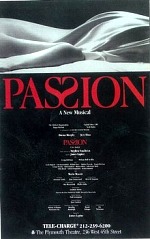
Version 1
Passion (1994-03-Plymouth Theatre-Broadway)
Type de série: OriginalThéâtre: Gerald Schoenfeld Theatre (Broadway - Etats-Unis) Durée : 8 mois Nombre : 52 previews - 280 représentationsPremière Preview : 24 March 1994
Première: 09 May 1994
Dernière: 07 January 1995Mise en scène : James Lapine • Chorégraphie : Producteur : Star(s) :

Version 2
Passion (1996-03-Queen's Theatre-London)
Type de série: Original LondonThéâtre: Sondheim Theatre (Londres - Angleterre) Durée : 6 mois Nombre : 232 représentationsPremière Preview : 13 March 1996
Première: 26 March 1996
Dernière: 28 September 1996Mise en scène : Jeremy Sams • Chorégraphie : Jonathan Butterell • Producteur : Star(s) : Avec: Michael Ball (Giorgio), Maria Friedman (Fosca), Helen Hobson (Clara), David Firth (Colonel Ricci), Hugh Ross (Doctor Tambourri), Michael Heath, Michael Cantwell, Simon Green, Ian McLamon,Commentaires : Based on Ettore Scola’s film “Passione d’Amore” and the novel “Fosca”, the 1994 Broadway production won four Tony Awards and was hailed as one of the most important musicals of recent years, running for 280 performances.
This production was the samae as the Broadway Production, except there was an intermission between Scene Seven and Scene Eight, and a new song in Scene Thirteen (called "No One Has Ever Loved Me" on the London concert recording, but not the same as the similarly titled selection on the Broadway recording). It is sung after the "Farewell Letter" by Giorgio in his confrontation with Doctor Tambourri.
The London production did not fare quite so well, in spite of rave notices for Maria Friedman and excellent ones for Michael Ball. The production was described as a “chamber opera” of such intensity that it would not be to everyone’s taste, but generally was highly praised and admired. It had a six month run, though at the end of the year it did receive the Evening Standard Award as the Best Musical of the Year.

Version 3
Passion (1996-04-TV)
Type de série:Théâtre: *** TV (*** - ***) Durée : Nombre : Première Preview : 25 April 1996
Première: 25 April 1996
Dernière: 25 April 1996Mise en scène : James Lapine • Chorégraphie : Producteur : Star(s) : Commentaires longs: Filmed January 16 - 18, 1995 at the Plymouth Theater,
shortly after the close of the Broadway Production
World Premiere: San Francisco International Film Festival,
AMC Kabuki Theatres, April 25 & 28, 1996
Televised September 8, 1996 on PBS's "American Playhouse"
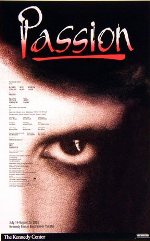
Version 5
Passion (2002-07-Kennedy Center-Washington)
Type de série: RevivalThéâtre: Kennedy Center for the Performing Arts (Washington - Etats-Unis) Durée : 1 mois Nombre : 15 représentationsPremière Preview : 19 July 2002
Première: 19 July 2002
Dernière: 23 August 2002Mise en scène : Eric Schaeffer • Chorégraphie : Producteur : Star(s) : Commentaires longs: Same as the Broadway Production, with the addition of the new song in Scene Thirteen, originally written for the London Production
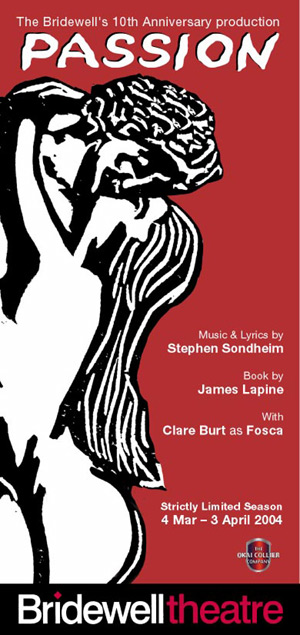
Version 6
Passion (2004-03-Bridewell Theatre-London)
Type de série: RevivalThéâtre: Bridewell Theatre (Londres - Angleterre) Durée : 3 semaines Nombre : Première Preview : 09 March 2004
Première: 09 March 2004
Dernière: 03 April 2004Mise en scène : Carol Metcalfe • Chorégraphie : Omar F. Okai • Mykal Rand • Producteur : Star(s) : Avec: Mark Carroll (Giorgio), Clare Burt (Fosca), Kate Arneil {Clara), Matthew White (Colonel Ricci), Simon Masterton (Doctor Tambourri), David Menkin, Nigel Pilkington, Christopher Jay, William Kenning, Dominic BrewerCommentaires : This small-scale revival marked the 10th anniversary show of the Bridewell company, and received a muted welcome from the critics. However, there was much praise for Clare Burt as Fosca.

Version 8
Passion (2005-03-Rose Theatre-LCPA-New York)
Type de série: RevivalThéâtre: Rose Theatre (Kingston - Angleterre) Durée : Nombre : 3 représentationsPremière Preview : 30 March 2005
Première: 30 March 2005
Dernière: 01 April 2005Mise en scène : Lonny Price • Chorégraphie : Aucun • Producteur : Star(s) : Commentaires : Semi-staged production, starring Michael Cerveris as Giorgio, Patti LuPone as Fosca, and Audra McDonald as Clara, was performed at Lincoln Center in New York for three performances, March 30 - April 1, 2005. This production was broadcast on the PBS television show "Live From Lincoln Center" on March 31, 2005. The score in this production preserved the musical revisions from the London version.

Version 9
Passion (2010-09-Donmar Warehouse-London)
Type de série: RevivalThéâtre: Donmar Warehouse (Londres - Angleterre) Durée : 2 mois 2 semaines Nombre : Première Preview : 10 September 2010
Première: 10 September 2010
Dernière: 27 November 2010Mise en scène : Jamie Lloyd • Chorégraphie : Producteur : Star(s) : Avec: David Thaxton (Giorgio), Elena Roger ( Fosca), Scarlett Strallen ( Clara ), David Birrell (Colonel Ricci), Allan Corduner (Doctor Tambourri), Simon Bailey, Haydn Oakley, Ross Dawes, Tim Morgan, Iwan Lewis.Commentaires : This revival, part of Stephen Sondheim's 80th birthday celebrations, received almost unanimous critical praise and won the Evening Standard Best Musical Award, while David Thaxton won the Olivier Award for the Best Actor in a Musical. Elena Roger’s outstandingly moving performance missed out on the Best Actress in a Musical Award, which went to Sheridan Smith for “Legally Blonde” – something which caused a lot of controversy.Presse : "...if the result is a triumph, it is because of the production's enfolding intimacy and an imaginative stroke of casting....Maybe this will never be Sondheim's most loved show; but what this production beautifully communicates is the unstoppable force of passion." Michael Billington for The Guardian
"Everything about Passion is breathtaking." Mark Shenton for The Stage
"I never thought I could love Passion, and maybe now I do." Matt Wolf for The Arts Desk
"I watched Jamie Lloyd’s superb new production in a state of rapt concentration, and at the end felt I had witnessed a masterpiece...You may either love or hate this show, but it is impossible to feel indifferent to its raw power and emotional candour." Charles Spencer for The Daily Telegraph
"Passion, despite its gorgeousness, feels cold. Not so much a passionate work as a consideration of what it means to be passionate, it has too narrow an emotional range. It shows Sondheim at his most operatic, but for all the gestures in the direction of Puccini there are no soaring arias to carry us aloft. The characters are unsympathetic, and the humourless storytelling results in their drama lacking real humanity." Henry Hitchings for The Evening Standard
"Elena Roger's Fosca is a performance to die for." Paul Callan for Daily Express
" Jamie Lloyd's Donmar revival of this rebarbative 1994 musical makes a compelling case for its power to unsettle and affront." Paul Taylor for Independent
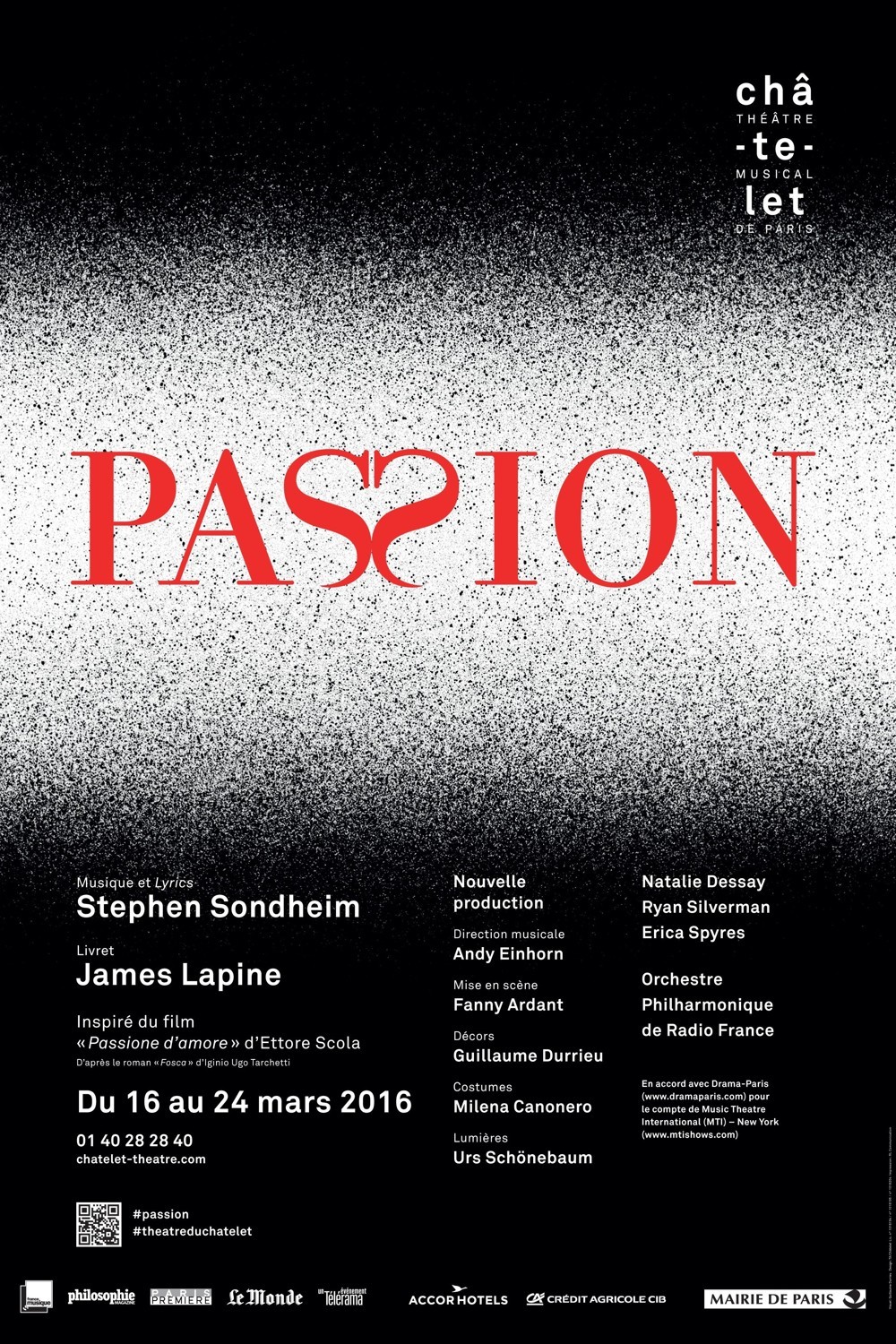
Version 10
Passion (2016-03-Théâtre du Châtelet-Paris)
Type de série: RevivalThéâtre: Théâtre du Châtelet (Paris - France) Durée : 1 semaine Nombre : 7 représentationsPremière Preview : 16 March 2016
Première: 16 March 2016
Dernière: 24 March 2016Mise en scène : Fanny Ardant • Chorégraphie : Jean Guizerix • Producteur : Star(s) : Avec: Natalie Dessay (Fosca), Ryan Silverman (Captain Giorgio Bachetti), Erica Spyres (Clara), Shea Owens (Colonel Ricci), Karl Haynes (Docteur Tambourri), Michael Kelly (Sergeant Lombardi, Cook), Nicholas Garrett (Lieutenant Barri et le père de Fosca), Franck Lopez (Major Rizzolli), Damian Thantrey (Count Ludovic), Matthew Gamble (Private Augenti), Tara Venditti (La mère de Fosca), Kimy McLaren (Mistress)Commentaires : Après A Little Night Music, Sweeney Todd, Sunday in the Park with George et Into the Woods, le Châtelet continue à faire découvrir aux Français l’œuvre de Stephen Sondheim avec l’une de ses œuvres les plus rares : Passion.
Pas encore de video disponible pour ce spectacle
